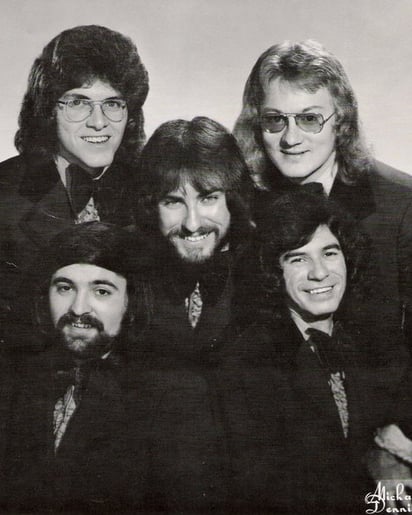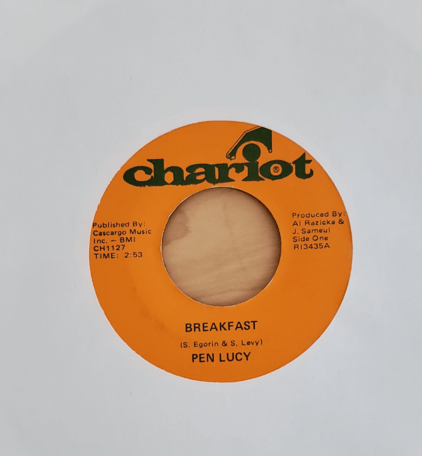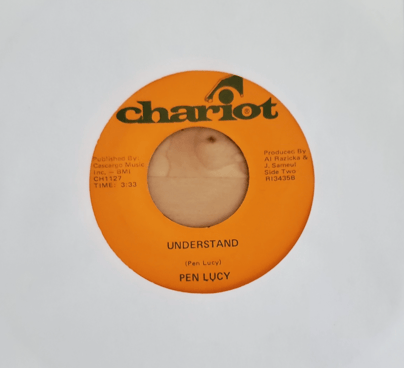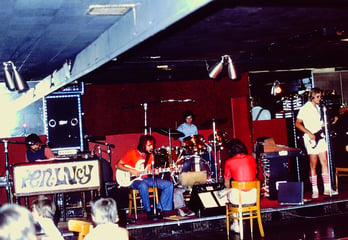Baltimore Mystery No. 2: Pen Lucy's 45, Breakfast
A Baltimore Band's Sonic Masterpiece
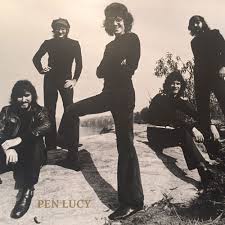

Pen Lucy formed in the late 1960’s as an offshoot of the legendary Bob Brady and the Con Chords. During the 1970s, Pen Lucy was the face of Baltimore’s live music festival and nightclub scene. From the Club Venus and Golden 40 Inn, to teen and college dances, to opening for the Who at the Merriweather Post Pavilion in 1969. They were everywhere and they did it all with great style. Pen Lucy was not a ‘stand onstage and shoegaze’ type of band. There were floorshows with plenty of clever musical medleys. They were consummate professionals and extremely talented musicians.
I knew Pen Lucy, well, being a frequenter of high school mixers in the early ‘70s. I was happily surprised one morning to hear a record by Pen Lucy played over my favorite FM station, WLPL. The year was 1972 and the song was Breakfast. And, what a record. Even my sixteen-year-old brain knew that this record was special: clever lyrics, great, Sgt. Pepper’s sounding melodies and a rousing, brassy Chicago - style horn arrangement. The recording and performances were impeccable: great lead and background vocals, perfect rhythm section performance, great arrangement and a superlative sound production. I earnestly presumed that Breakfast would be the record to break Pen Lucy to a national audience. But in that era, moving a single release from a local to national market was a daunting task. It was no longer the 60s. And that’s why relatively few people have heard the 45.
I had never forgotten about the Breakfast 45. I searched for it on the web and was surprised that, unlike a million other 45s, it was not available on YouTube. Not to worry. I was able to obtain a nice copy from an eBay seller a few years ago.
Today we chat with Jim Samuel, keyboardist and one of the songwriters for Pen Lucy. He’s here to solve our 45 rpm mystery: The making of Breakfast.
Q. Bob Brady and the Con Chords were probably Baltimore’s most well-known band of the ‘60s. They released several 45s that broke nationally. How and why did Pen Lucy spin off from the Con Chords?
A. Well, it’s the usual situation of musical differences. Bob Brady was a masterful, blue-eyed soul singer. His falsetto rivaled Smokey Robinson’s. We had been mining that vein throughout the 60’s, but the band could sense that the times were changing. Musical tastes were changing. We wanted to move away from blue-eyed soul and explore the jazzier side of rock. Bands like Chicago and Blood Sweat and Tears were making their mark. We wanted more musical freedom. Basically, Pen Lucy was the Con Chords without Bob Brady. Bob continued the Con Chords after we split off, but with new personnel.
Q. I understand that the band was named after the Pen Lucy neighborhood in Baltimore. Did the band members live in, or grow up in, Pen Lucy?
A. Our drummer, Marty Fisher, used to live in Pen Lucy and his house served as a meeting place for the band. Initially we debated whether to use Pen Lucy as the name versus FUN as the name. Lucy won.
Q. What brought about the recording of Breakfast?
A. We had worked with several record executives throughout our stint as the Con Chords and later Pen Lucy. Ed Dejoy, who was president of the Chess/Janus label at the time, brought us the song. Breakfast was written by Sammy Egorin and Stuart Levy. I believe Stuart Levy composed the music and Sammy Egorin the lyrics. Sammy was a fellow Baltimorean who went on to co-write many pop songs including hits for the Bay City Rollers. He probably had his greatest success writing with another local talent, Tony Sciuto. Ed Dejoy felt the song would work best with more of a "country" feel to it. (Ed may have been feeling a little "country," then, as this was just about the time he worked with Ray Stevens on Steven’s country version of Misty). But I heard something else, entirely. I felt we could do the song justice with a Beatles-type approach. Something like Sgt. Pepper’s – like Penny Lane or Magical Mystery Tour. The song was lyrically strong and clever, like the Beatles. And very upbeat and pop sounding. I didn’t see it working as a country song. I also saw it with full brass and strings.
Q. The record label was Chariot Records. How did Chariot become involved?
A. Chariot Records was a local label owned by Ed Dejoy, Joe Cash, Brent Gordon and John Powell. Chariot and its parallel music publishing company, Cascargo, were behind all of the Bob Brady and the Con Chord releases. I previously mentioned Ed Dejoy’s background as president of Chess/Janus. Joe (Jonas) Cash was known as a “hit predictor” and went on to fame in radio promotion. Brent Gordon became a V.P. of Warner Brothers records. John Powell was a national sales rep. for A&M Records. Ed and Chariot signed Pen Lucy to record Breakfast. We enlisted the aid of Al Ruzicka to assist with production. Al was a friend of the band and played keyboards for Tommy Vann and the Professionals at that time. We were working with Al on another song and asked him to jump in with us on Breakfast. Al went on to write songs for the Four Seasons and Diana Ross. Ed suggested we record one of our own compositions for the flip side. We had been working on a track composed by the group called Understand. It had a country rock flavor which Ed liked. Al Ruzicka and I co-produced both songs.
Q. Where did you record Breakfast and Understand?
A. At a studio in Hunt Valley called ITI and later known as Blue Seas. You’ve probably heard of George Massenburg. He was the engineer. George was a brilliant guy with a great ear. He also designed audio equipment including the earliest parametric equalizer, cutting edge at the time. George went on to record and produce many famous groups like Earth Wind and Fire, Linda Ronstadt and Little Feat. He won a couple Grammy Awards, too.
Q. Who played what on Breakfast?
A. George Layfield was the lead vocalist. George really had an amazing voice. Tommy Thompson played bass, Marty Fischer was drummer and Denny Zwirlein played the guitar parts. I played electric piano. You can hear the harpsichord - type sound in the intro. Denny, Tommy and George added the background harmonies.
Q. Who provided the incredible brass and strings?
A. Well, I had some contacts over at the music department at Towson State College (now Towson University). We were able to get Hank Levy and the Towson State Jazz Ensemble to provide the brass and strings. I wrote out the chart for the group and Hank Levy put it all together and arranged it. As you can imagine, this was a big deal to us, because Hank’s Jazz orchestra was acknowledged as one of the finest in the world.
Q. Did you accomplish everything in one recording session or were there several? Do you recall the length of the session(s)?
A. If memory serves, we began the session in the afternoon and recorded all night until the next morning. We completed tracking for both Breakfast and the flip side, Understand, in one very long session.
Q. Was Breakfast a difficult recording to make? Do you recall the number of takes you took for the basic tracks?
A. Breakfast was not difficult to record. We were very well rehearsed. I can’t remember the exact number of takes to get the basic tracks. Perhaps a half dozen or less. But I remember that Hank Levy’s group nailed their parts on the first take. Not surprising, of course. It was a fun recording. When we worked on the flip, Understand, we wanted a large sounding chorus for the end part. So we went around to the various nearby business offices (the studio was in a business park) and pulled volunteers in to sing on the track. We, and they, had a blast!
Q. Did you mix down the tracks later? Were they also mixed by George Massenburg?
A. The mix was done at a later time and completed by George Massenburg with input from me and Al.
Q. I really enjoyed hearing Breakfast played on our local FM station, WLPL. You and Chariot must have been disappointed that the 45 did not break into the national market.
A. We were disappointed with the failure of Breakfast to take off nationally. We were proud of the production. It, however, was not very danceable and might not have been a good fit for the changing trends in music at that time. Looking back on it, I think it could have had good commercial appeal for advertising of breakfast foods and cereals. Sammy's lyrics certainly hit that target. It is a shame that direction was not pursued by the record company.
Q. Pen Lucy was something of a musical emissary for Baltimore. Could you tell us about some of those opportunities?
A. Well, we were the first band to meet a Russian ship that landed in the U.S. since World War II. It was well covered by the Sun papers and caused some turmoil. We were invited to dinner on the ship (political dignitaries were not there) and ate with the sailors, exchanged gifts and actually jammed with a band of sailors all under the watchful eye of the FBI and KGB. An interesting event. We also were the band that played at the opening of the National Aquarium and were the featured band at one of the Preakness races. I had mentioned Ed DeJoy. Before his stint at Chess/Janus, Ed was a major exec. at A&M Records. He worked with many of A&M's big stars like the Carpenters, the 5th Dimension, Hall & Oats and Cat Stevens. In fact, Ed brought the Carpenters to my home during their first tour. Since we're talking all things “Baltimore,” I along with other members of the band and Bill Bateman (known for the Bateman restaurants) took the 5th Dimension for their first taste of steamed crabs after performing at the Club Venus.
Q. I understand that, after taking a break from music, you ultimately came to pursue jazz as your first calling. Could you tell us about any project or projects that you’re proud of?
A. I left music right after Pen Lucy to build a financial services business. Many years later as I approached retirement I got back into writing and recording in the Smooth Jazz market although I feel my songs were more like the instrumentals of the 60's-80's than jazz pieces. I have had a chance to record with great artists like Gerald Albright, Rob Tardik, Darryl Walker as well as members of groups like Prince, Justin Timberlake and Spyro Gyra. I have been lucky to have a number of songs hit the Smooth Jazz Top 20 charts and recently recorded a new song with a Netflix music producer and some great studio players in Argentina. Additionally, I have been writing for TV and Movies with a number of songs being picked up by production companies for upcoming shows. It has been a fun return to a very different world of music than the one I experienced with Pen Lucy.
Q. Any final words or observations about Breakfast or Understand?
A. I am proud of Breakfast and Understand and of the years I spent with Pen Lucy. I often run into people that will reminisce about the good times they had seeing the band perform. It is great to know that Pen Lucy brought some joy into their lives.
Thank you, Jim, for helping to solve this particular, local musical mystery. And check out Jim’s Smooth Jazz compositions on his YouTube channel: https://www.youtube.com/@JimSamuelProductions
